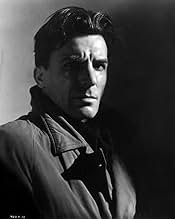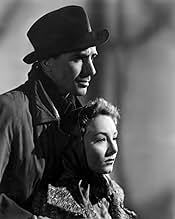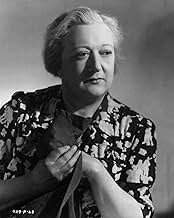A train disaster is told as four short stories to give character studies of the people involved, how it will affect them, and how they deal with it.A train disaster is told as four short stories to give character studies of the people involved, how it will affect them, and how they deal with it.A train disaster is told as four short stories to give character studies of the people involved, how it will affect them, and how they deal with it.
Patric Doonan
- Ron Stacey (segment "The Engine Driver")
- (as Patrick Doonan/Patric Doonan)
Featured reviews
This is a not very widely known portmanteau film from 1949, in which four disparate stories are told, each culminating in the protagonists boarding a train to Liverpool, their stories becoming ever more enmeshed, only this train is headed for disaster.
I largely agree with Robert Temple's review (although there are spoilers and it is John Clements who plays the composer, not Gregson).
In contrast to many of the other reviews I found something rather good in all four stories, be it drama, witty dialogue, or humour. I thought it was all rather well done actually. For me, the standout performance was probably that of Peter Finch, who looked gaunt and utterly riven throughout.
In addition to the intriguing structure of the film -which has surely acted as an example to later directors- this film has interest today because it shows many street scenes in London and various scenes shot on the railways; who would have thought the age of steam would be over about fifteen years after this?
Anyway whilst some of the facets of this film will be lost on some folk, overall I thought it a pretty good effort, deserving to be better known and more widely appreciated than it is. Eight out of ten from me.
I largely agree with Robert Temple's review (although there are spoilers and it is John Clements who plays the composer, not Gregson).
In contrast to many of the other reviews I found something rather good in all four stories, be it drama, witty dialogue, or humour. I thought it was all rather well done actually. For me, the standout performance was probably that of Peter Finch, who looked gaunt and utterly riven throughout.
In addition to the intriguing structure of the film -which has surely acted as an example to later directors- this film has interest today because it shows many street scenes in London and various scenes shot on the railways; who would have thought the age of steam would be over about fifteen years after this?
Anyway whilst some of the facets of this film will be lost on some folk, overall I thought it a pretty good effort, deserving to be better known and more widely appreciated than it is. Eight out of ten from me.
Compenium films such as these were very popular in the late forties.Naturally their success rides and falls on the quality of the story.Alas in this case only one of the stories is worth telling.The Valerie Hobson/John Clements story is truly awful.Jack Warners domestic problems seem more like an episode of the Huggetts.The ex German POW story has some promise but becomes repetitive.The Peter Finch/Mary Morris story is quite good but is undermined by the somewhat ridiculous proposition that a murderer would cart the dead body of his wife around in a theatrical basket.The fact that there is a good cast,and a strong band of writers and directors make it all the more disappointing.The most interesting aspect of the film is the considerable location work,which includes a view of the late lamented Euston arch.
Ealing Studios portmanteau drama that starts with a train crash, then follows four separate stories, showing the backstories of some of the passengers, the events that led to them being on the train, and the aftermath of the crash. Some big names of the day (Jack Warner, Susan Shaw, Miles Malleson, John Gregson, Valerie Hobson, Michael Hordern, and 'introducing' a very young Peter Finch). Several directors and writers involved, including Basil Dearden (who had a hand in both). Made over 70 years ago, but it stands up well. 7/10.
This film is one of the finest achievements of British cinema in the immediate post-War period, having been shot in March of 1948 (as a calendar in one shot shows) and released in 1949. The film is remarkable for the 'introducing' of Peter Finch, who is absolutely brilliant as a tormented young man who has been driven mad by six years in the Army and his faithless and tormenting wife, played with skin-crawling provocation by the relentless Mary Morris, one of the finer actresses of that period. Their story is a distinct film noir strand in the tapestry woven of separate stories of people over the three days prior to their boarding an ill-fated train from London's Euston Station to Liverpool, on the ominously-named Platform 13. Although this is a film of multiple story-lines all converging on a single journey, they are all compelling, and there is no sense of lack of unity. In other words, the bold project of making this film paid off and is a complete creative success. The film is compulsive viewing for anyone familiar with or interested in how certain places and things looked in the London of 1948, as the location shooting is very extensive indeed, and it is in that sense like a time-capsule travelogue. I sat watching this recently released DVD with my finger on the pause button for the entire time. I must have stopped it and rewound thirty or forty times, all agog at how clearly it showed the immediate post-War Kings Cross area (now being totally redeveloped), the old Euston Station, the Strand, Trafalgar Square, and other locations. Anyone interested in steam trains will find the many detailed shots of them irresistible, because the train driver (solidly played by Jack Warner) is a main character, and we see every aspect of servicing, turning round, and operating the trains, with a thoroughness and multiplicity of close-ups of the machinery approaching that of a documentary, and reminding one of the famous documentary film NIGHT MAIL (1936). The film is never dull for a moment, but is constantly fascinating to watch, and operates on many levels successfully. There are such witty lines in the script, and the dialogue is often priceless, especially when the train driver and his wife are speaking to one another in their pungent manner at home. I laughed out loud on numerous occasions, as the Ealing sensitivity to comedy is always hovering in the background and present in the dialogue, despite this film being very far from a comedy, and containing desperately tragic tales of overwhelming intensity. There are some spectacularly amusing and wonderful character parts, recording on film some types of people who have entirely vanished now from the face of the earth and will never come again. Watching this film is like entering a living museum of how things were in London in 1948. It really is a staggering experience if you have any interest in that at all, and in the old England as it really was, and shall be no more. Perhaps the most harrowing performance in the film is by the young actress Joan Dowling, who puts her all into the tragic role of a girl whose parents have been killed in the Blitz and she has no one and nothing left except her love for a former German soldier who refuses to return to Germany because ' he betrayed us and destroyed my country'. (The 'he' is Hitler, and it is very effective never mentioning him by name.) The sheer terror of this penniless couple as they run from the police, are thrown out of their cold and horrible flat by a heartless landlady, and sneak around London trying to avoid his being seized and deported is heart-breaking. When they take refuge in an even more depressing flat, with the wallpaper peeling off the damp walls, in Delancey Street in Camden Town, they have really reached rock-bottom. She steals the money to buy a fare from Liverpool to Canada for him to start a new life there, sacrificing herself because she knows she can never earn the money to get a fare for herself to join him. Her performance is enough to make the most hardened cynic cry. This amazing actress, then aged 20, committed suicide at the age of 26, thereby realizing her own personal tragedy to equal that which she experiences in this film. This couple too are on the fated train. Then there is the story of the orchestra conductor and composer, played by John Gregson, whose archly amusing upper-class wife (showing great skill with her silver tea service) is played by Valerie Hobson. Gregson is always having affairs and this time it is with a tempestuous young pianist played with tremendous flair by a real pianist, the Russian musician, prima ballerina, and actress Irina Baronova, who only appeared in four films, abandoning the cinema in 1951 after her marriage, which was a great loss to the screen. (She was the mother of the actress Victoria Tennant, who despite her wide range of work has, like her mother, been seriously under-appreciated. For instance, Tennant gave one of the finest performances in the TV series THE WINDS OF WAR in 1983 but was never praised properly for it. Why is it that these two amazing women have never been given their due of attention for their unique qualities?) This film had three directors, Sidney Cole and Charles Crichton, who did one segment each, and Basil Dearden, who did two, namely the two with the most powerful performances (Finch's and Dowling's). The different segments are blended seamlessly, but we are not told who was in overall creative charge in order to pull off so successfully the unifying of this multi-stranded film. Unlike anthology films of the period which show separate stories in succession, these stories are all contemporaneous, and converge. This film is an incredible creative triumph.
10clanciai
This is so much better than all the mass of train thrilers, all excellent and outstanding in suspense, while this one is no thriller but all perfectly natural, telling the stories of very ordinary people om board a train heading for disaster. The character you will remember best and forever is probably Peter Finch in his first film role as a Shakespeare actor in a truly tragic part, having lost his life and soul in six years of war and being constantly betrayed by his wife. His story is a drama in itself, while the other three destinies that are being followed are easier to digest, the story of the train driver, the story of a conceited conductor, his piano soloist and his wife, and the story of a German refugee, still suffering from the traumas of his past. Above all, the story is ingeniously conceived, weaving together four very different destinies, totally different from each other, none knowing anything about the others, and there are som police investigators as well, headed by Michael Hordern. There are so many dimensions to this film, the concert hall, the Shakespeare theatre, the domestic circumstances of the train driver and his family and friends, and the desperate circumstances of the refugee and his self-sacrficing girl getting their hardship exacerbated by a ruthless callous landlady. It's a pearl of cinematic invention, and the music adds to genuine quality as well. This is a film to enjoy and admire - and to have your compassion boosted with.
Did you know
- TriviaPeter Finch and Laurence Payne received "and introducing" credits.
- GoofsWithin the first minute and a half of the film the locomotive pulling the Euston to Liverpool express varies several times in cut shots from the largest 4-6-2 "Duchess" express locomotive to a variety of different, smaller 4-6-0 locomotives, variously with or without smoke deflectors, with single or double chimneys, with tapered or parallel boilers and with different numbers and tender insignias ("British Railways" or "LMS"). At one point a "Duchess" is seen again. Locomotive classes seen pulling the same train without it stopping thus include "Duchess", "Jubilee", "Patriot" and "Royal Scot".
- Quotes
Doris Hardcastle (segment "The Engine Driver"): Oh, it's you...
Ron Stacey (segment "The Engine Driver"): Well, don't overwhelm me ducks. I dunno as my poor old ticker'll stand it.
- ConnectionsFeatured in Remembering John Gregson (2019)
- SoundtracksThese Foolish Things (Remind Me Of You)
(uncredited)
Music by Jack Strachey and Harry Link
Lyrics by Eric Maschwitz
Sung by Leslie Hutchinson
Played in Philip's apartment
Details
- Runtime1 hour 28 minutes
- Color
- Aspect ratio
- 1.37 : 1
Contribute to this page
Suggest an edit or add missing content

































